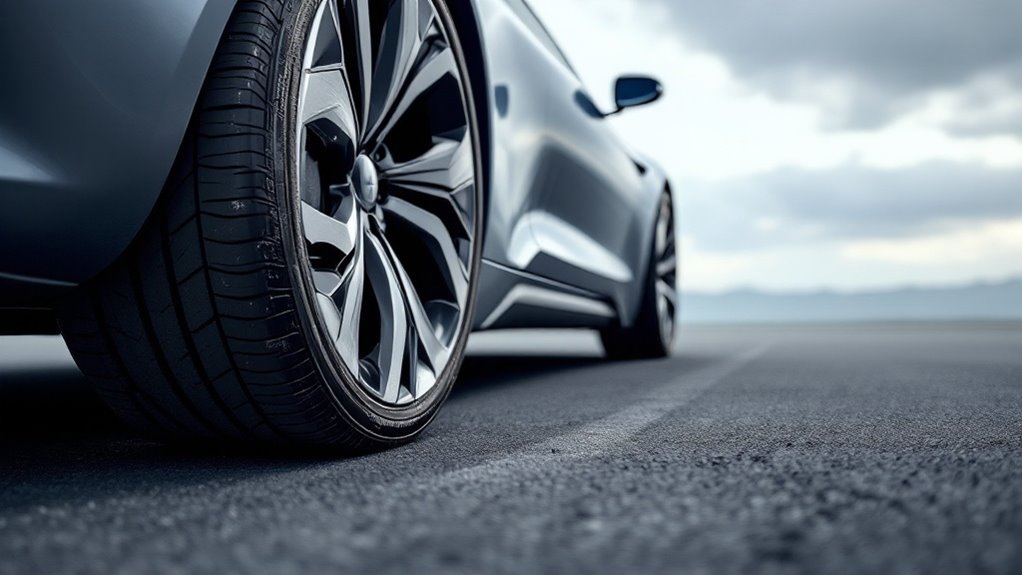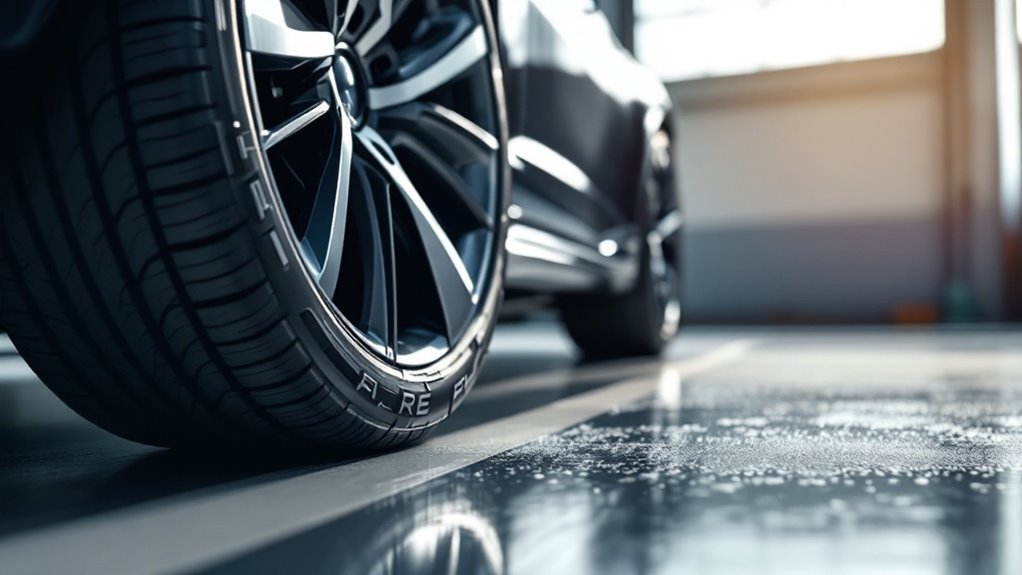Are Ev Tires More Expensive
This post contains affiliate links. As an Amazon Associate, we earn from qualifying purchases.
Are EV tires pricier than regular ones? Yes, they sure are! EV tires often cost 20-30% more. Think about $150 to $300 for each tire. Regular tires? They range from $80 to $200 each. Why the big difference? EV tires have a special design. They support heavier vehicles and unique needs. Engineers make them for low rolling resistance. They also handle high torque stress well. That durability raises the price a lot. Check this quick comparison:
- EV Tires: $150-$300 each
- Regular Tires: $80-$200 each
Curious for more details? Stick around to learn extra facts!
Essential Facts in 30 Seconds
- EV tires cost between $150 and $300 each, more than regular tires.
- They wear out 20% faster, leading to higher replacement frequency.
- EV tires are 20-30% more expensive than tires for gas-powered vehicles.
- Higher costs are due to special designs for handling weight and torque.
- Budgeting for frequent replacements is necessary due to their shorter lifespan.
Cost Analysis of EV Tires vs. Regular Tires
Electric vehicles, or EVs, save money on fuel. But, their tires cost more. EV tires range from $150 to $300 each. Why so pricey? They use special tech for high power and braking. Regular tires are cheaper, yet not right for EVs.
Check this simple cost list:
- EV Tires: $150–$300 per tire. Special design adds to the price.
- Regular Tires: Cost less, but they don’t match EV needs.
Think about these costs for your EV budget. Non-EV tires wear out fast. That means more money over time. Additionally, EV tires are engineered to handle heavier vehicle weight, which contributes to their higher cost. Furthermore, the use of lower rolling resistance technology in EV tires enhances their efficiency and contributes to their overall performance.
Stay updated on tire prices. Always pick tires the maker suggests. This keeps you safe and saves cash.
Wear Patterns and Durability of EV Tires

EV tires face special wear challenges unlike regular car tires. They wear out 20% faster, lasting only 12,000 miles. Normal car tires last up to 25,000 miles.
Why so quick? EVs have instant torque and heavy weight. Torque makes tires scrub and lose rubber fast. Heavy weight, 20-30% more than regular cars, adds stress. This causes uneven wear on driven wheels.
Check tread depth often to spot problems early. Keep tire pressure at the right level. Additionally, lower rolling resistance in EV tires helps improve range and battery life.
See rubber bits on roads? That’s torque damage. Notice uneven sidewall patterns? Blame the extra weight.
Pick EV-specific tires for better strength. These tires handle higher loads well. Stick to a tight maintenance plan. It helps tires last longer.
Performance and Safety Aspects of EV Tires

EV tires play a big role in your driving experience. They boost performance and keep you safe. These tires use cool technology for low rolling resistance. That cuts energy use by up to 20%. Your vehicle can go farther on one charge.
Take Michelin Primacy MXM4 tires as an example. They lower rolling resistance by 25%. That means better efficiency for your EV. Proper tire inflation is essential for maximizing range, as underinflated tires increase rolling resistance and drain battery power. Tire selection is crucial for optimizing the performance of electric vehicles.
Safety matters a lot with these tires. They carry heavy EV battery weight. They also handle strong torque from electric motors. This keeps your ride stable and under control.
Check out these key points:
- Load Capacity: Holds up under heavy EV weight.
- Torque Strength: Deals with sudden power bursts.
- Quiet Ride: Cuts down road noise for comfort.
Special designs make tires like Hankook ion evo AS stand out. They use unique materials for better drives. You get safer trips and top performance. Your EV stays secure on every road.
Availability Challenges for EV Tires

Electric vehicle tires bring many availability issues for owners. Finding the right tires can be tough. Especially in new markets, options stay very limited. Supply chain problems cause delays and stock shortages. This frustrates many EV drivers every day.
Tire choices for EVs are also few. Picking a tire that fits your needs is hard. Many drivers lack info on EV tire details. Let’s solve this with simple steps. Check local shops for tire stock often. Look at online stores for more choices. Keep learning about new EV tire updates.
Production of EV tires is still small. Data shows only 5% of tire shops stock them. Plan ahead to avoid long waits. Stay patient and search early for tires. Your EV deserves the best match!
Maintenance Expenses Related to EV Tires

Think about the costs of maintaining EV tires. They can hit your wallet hard.
EV tires often cost 20-30% more than regular car tires. Why? Their design suits heavier loads and better performance. Expect to replace them more often too. The quick torque and fast speed of EVs wear tires out. They can wear 20% faster than normal. So, you’ll need new tires sooner than with gas cars.
Keep an eye on tire wear. Check these numbers for replacement timing:
– Average Tire Life: EV tires last 30,000-40,000 miles. Gas car tires? About 40,000-50,000 miles. It depends on how you drive and road conditions.
Additionally, proper tire maintenance is crucial for enhancing overall vehicle safety and extending the life of your tires.
Stay smart about tire care to save money!
Higher Replacement Costs
Electric vehicle ownership comes with higher tire replacement costs. These costs really add up fast! Basic EV tires cost $150 to $300 each. For high-performance ones, expect $300 to $600 per tire. A full set might hit $1,200 or even more.
Why so expensive? EV tires use special tech for noise reduction. They also support heavier weights with strong builds. This raises production costs a lot. In fact, similar to Load Range E, EV tires are designed to handle increased weight and performance demands.
Check this simple cost breakdown:
- Basic EV Tires: $600–$1,200 for four.
- Performance Tires: $1,200–$2,400 for four.
Plan your budget for these replacements. Savings on engine care won’t cover tire expenses. Think ahead to avoid surprises!
Frequent Tire Changes
Think about the cost of changing EV tires often.
Electric vehicles have special torque and braking systems. These cause tires to wear out faster. Not checking tires monthly makes it worse. Bad driving habits add to the problem. Speeding up too fast or city traffic harms tires. You might need new tires sooner.
Look at these expenses:
- Tire rotations cost $30 to $40 every 7,500 miles.
- New tires may cost $150 to $300 each.
Larger tires may reduce braking distance, contributing to the overall performance of the vehicle.
Tips for Selecting EV Tires

Electric cars need special tires because of heavy batteries. Always check the load index on tires. Look for “HL” labels to ensure safety. Your owner’s manual shows the right load rating. Pick tires with strong sidewalls for extra support. Sidewall thickness is vital for ensuring the tires can handle the weight of the vehicle.
Energy efficiency matters a lot for EVs. Choose tires with low rolling resistance. They cut down friction and boost your range. Search for EV-specific designs that help battery life. These tires also offer good grip.
EVs run quietly, so tire noise stands out. Select tires with noise reduction features. Special tread patterns keep the cabin calm.
Think about your weather too. Grab winter tires for cold places. Opt for heat-resistant tires in hot areas. This keeps you safe all year!
Frequently Asked Questions
Can EV Tires Be Used on Non-Ev Vehicles?
Can you use EV tires on non-EV cars? Yes, if the size matches! Check the specs first to be safe. EV tires fit some regular cars too. But, don’t hope for huge changes. EV tires suit electric cars’ special needs. They handle heavy weight and quick starts. Data shows EV tires wear differently. Studies say they last 20% less on gas cars. Stick to tires made for your vehicle. Ask a tire expert for help. Stay safe on the road!
Do EV Tires Affect Vehicle Range Significantly?
Tires matter a lot for EV range. Worn tires can increase range by 6%. Isn’t that surprising? Keep tires in good shape for best results. Efficient tires help you drive farther. Don’t skip tire checks ever. Save energy with every charge!
Are EV Tires More Environmentally Friendly?
Are EV tires better for the planet? Let’s explore this topic together! EV tires often wear out faster due to heavy electric cars. Yet, new materials cut down on harmful pollution. Studies show some EV tires reduce waste by 20%. That’s a big win for nature! Make smart picks and help save the earth. Every small step counts a lot!
How Do EV Tires Handle Extreme Weather?
Got questions about EV tires in extreme weather? Let’s break it down fast. EV tires face tough challenges in snow or heat. Winter tires give amazing grip on icy roads. They keep you safe with better control. Studies show winter tires cut stopping distance by 25% on snow. Proper tread depth stops skids in rain or slush. Always check tire pressure for top performance. Low pressure wastes energy and risks blowouts. Hot weather can wear tires out quicker too. Pick tires made for your climate. Stay safe and drive smart every season!
Do EV Tires Require Special Installation Tools?
Got an EV? Let’s dive into tire installation! You need special tools for the job. Grab polymer-coated sockets to avoid damage. Use a torque wrench for perfect tightness. These tools keep your tires safe. Proper gear means better maintenance at home. Trust me, don’t skip on quality!
Conclusion
Electric vehicle tires often cost more than regular ones. Why? They handle heavier loads due to battery weight. Data shows EV tires can be 20-30% pricier. Still, they protect your car’s performance. Pick tires made for EVs. They have strong sidewalls for safety. Durability matters on every ride. Check them often to avoid issues. Save money by choosing quality now. A smooth trip awaits you always!
